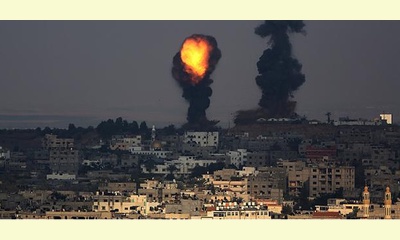|
|
Amnesty International on the Israel/Gaza conflict: Questions and Answers
an article by Amnesty International
What does Amnesty International think of the resolution
passed by the UN Human Rights Council on 23 July? What
should happen next? 
Smoke rises after an Israeli airstrike in Al Shejaeiya neighbourhood during a military operation in eastern Gaza City, 22 July 2014.© EPA
click on photo to enlarge
Amnesty International welcomes resolution S-21/1 to
establish a commission of inquiry and notes that the wording
allows the commission to investigate violations of
international law by all parties to the current conflict. The
commission of inquiry represents an important opportunity to
break the cycle of persistent impunity for crimes under
international law in Israel and the Occupied Palestinian
Territories (OPT). In order to be effective the commission of
inquiry must be thorough, independent and impartial, and
look into violations by any party to the conflict. It must be
adequately resourced and have unrestricted access to all
relevant areas. Amnesty International urges all states –
including all EU member states, who abstained on the
resolution – to co-operate with the commission as required.
What are the key obligations of the parties to the conflict
during the hostilities under international humanitarian law?
During an armed conflict, all parties – whether state or non-
state armed forces – must respect international humanitarian
law, which aims to protect civilians by regulating the conduct
of all sides in hostilities. States also continue to have an
obligation to respect international human rights law during a
conflict.
Under international humanitarian law, all sides in an armed
conflict must distinguish between military targets and civilians
and civilian structures, and direct attacks only at the former.
Deliberate attacks on civilians or civilian objects – such as
homes, medical facilities, schools, governmental buildings –
that are not being used for military purposes are prohibited
and are war crimes. Indiscriminate and disproportionate
attacks (where the likely number of civilian casualties or
damage to civilian property outweighs the anticipated military
advantage to be gained) are also prohibited.
All sides must take necessary precautions in attack to
minimize harm to civilians and civilian objects. This includes
giving civilians effective warnings ahead of attacks, and
cancelling or suspending an attack if it becomes apparent that
the target is civilian or that the attack would be
disproportionate. They also must take all feasible precautions
to protect civilians under their control from the effects of
attacks. For example, warring parties should avoid
endangering civilians by storing ammunition in, and launching
attacks from, populated civilian areas.
What are the different patterns of violations by Israeli
forces in the Gaza Strip that Amnesty International has
identified since Israel launched Operation “Protective Edge” on
8 July 2014?
Israeli forces have carried out attacks that have killed
hundreds of civilians, using precision weaponry such as
drone-fired missiles, as well as munitions such as artillery,
which cannot be precisely targeted, on very densely populated
residential areas, such as Shuja’iyyeh. They have also directly
attacked thousands of homes. Israel appears to consider the
homes of people associated with Hamas to be legitimate
military targets, a stance that does not conform to
international humanitarian law.
(This article is continued in the discussionboard)
(Click here for a Spanish version of this article or here for a French version.)
|








|
DISCUSSION
There is no question yet associated with this article.
* * * * *
LATEST READER COMMENT:
(The following is continued from the main article listed above.)
Several medical facilities and non-military governmental buildings across the Gaza Strip have also been destroyed or damaged. The UN has reported that one of its schools sheltering displaced people in the al-Maghazi refugee camp in central Gaza was shelled by Israeli forces on at least two occasions. Another such school sheltering displaced families in Beit Hanoun in northern Gaza was struck on 24 July, killing at least 15 civilians and injuring many others, and the UN has called for an immediate investigation.
Although the Israeli authorities claim to be warning civilians in Gaza, a consistent pattern has emerged that their actions do not constitute an “effective warning” under international humanitarian law. Israeli attacks have also caused mass displacement of Palestinian civilians within the Gaza Strip.
What is Amnesty International’s position on the firing of indiscriminate rockets and mortars from the Gaza Strip by Palestinian armed groups? Do other actions of Palestinian armed groups in Gaza since 8 July 2014 violate international humanitarian law?
According to the Israeli army, Hamas’ military wing and other Palestinian armed groups fired over 1,700 rockets into Israel from 8 to 18 July, and scores of rockets continue to be fired every day. Three civilians in Israel have been killed. Homes and other civilian properties in Israel have been damaged. International humanitarian law prohibits the use of weapons that are by nature indiscriminate. The rockets fired from Gaza into Israel cannot be aimed exactly at their objective and their use violates international humanitarian law. . ...more.

|
|









